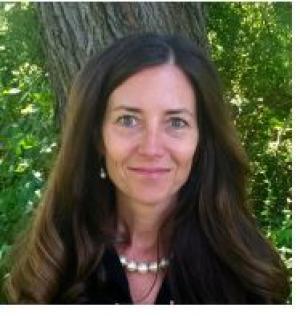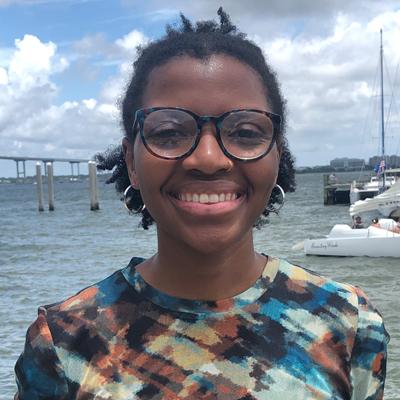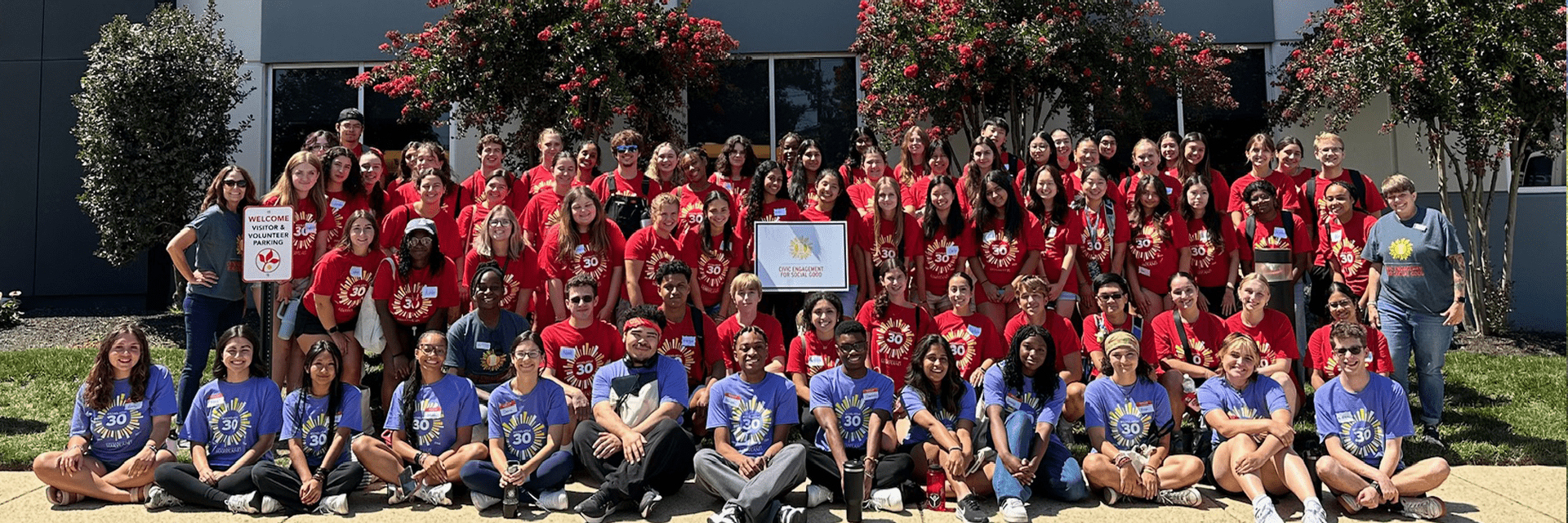Civic Engagement for Social Good
Inspiring community collaboration and meaningful change
Introduction
The world critically needs changemakers committed to understanding social issues and collaborating alongside their communities to foster meaningful change. In Civic Engagement for Social Good (CESG), previously known as CIVICUS, students work with organizations addressing a range of societal challenges, including poverty, food insecurity, housing insecurity, child welfare, education, political activism, animal rights, and the environment. Students explore:
- Issues impacting local communities
- Organizations that are addressing pressing social issues
- Ways to engage in hands-on work in civic engagement
- Strategies for deliberative dialogue in a multicultural world
- Methods to leverage their strengths to make sustainable change
CESG coursework and community engagement activities operate in tandem, creating a synergy that enhances the overall student experience. Coursework provides an opportunity for students to explore the root causes of social needs and strategies for addressing social concerns that they see during their work in the community, while service projects and co-curricular activities create an environment for students to implement what they learn in the classroom.
As an interdisciplinary program, CESG students represent a wide range of academic interests and majors. Civic Engagement for Social Good encourages students to ground their work in their passions, academic majors, and professional interests.
Through their shared passion for social good and engagement in co-curricular activities, CESG students form a close cohort who develop strong friendships and support each other throughout their time at UMD.
Colloquium and Lecture Topics
- The complexities and the structures that cause social issues
- Concepts related to the theories and practices of civic engagement
- Models for working towards positive social change
- Ways to engage in difficult conversations with empathy around differences of perspective, beliefs, and identities
[This program] has made me a kinder, more compassionate, more informed person. [It] gave me the opportunity to get my hands dirty, to engage in the community in ways I never thought I could. [It] has taught me that it takes a village but also that I can make tremendous change myself..providing me with more opportunities for learning and character-building than I would've gotten in any other program or club.
Other Learning Opportunities
Students are actively engaged in UMD, College Park and surrounding areas, and Washington, DC annually completing over 1,000 hours of volunteer work. Students can choose from over 100 projects per year with a wide array of partner organizations.
Students:
- Participate in civic engagement projects. Recently, students have acted as mentors for local elementary students, planted trees to increase the canopy in Washington, DC, served meals from a mobile soup kitchen, handled dogs at a humane rescue adoption event, canvassed on behalf of political candidates, and captioned videos to ensure accessibility for a wider community.
- Take trips to Washington DC and the surrounding area where they participate in scavenger hunts, visit memorials, monuments, and museums, and attend baseball games, cultural heritage events, and the performing arts.
- Meet guest speakers, including politicians, staff members from local non-profit organizations, and local community leaders and activists
- Participate in community-building activities, such as challenge courses, trivia nights, bingo, BBQs, and study breaks
CESG staff provide the planning, logistical support, and transportation for most activities. All second-year students also participate in a capstone experience for academic credit. The capstone can include an internship, extensive work with a non-profit, or affiliated experiential learning courses. Students in the past have held internships in local and national politics, non-profits, high-profile media outlets, medical facilities, research labs, mentoring organizations, and peer dialogue training. The capstone gives students authentic experiences and skills that help support their academic work, career goals, and future community engagement efforts.
Curriculum Overview
Over the two-year program (four semesters), students complete 12-credit hours that count toward their CESG Scholars citation. The following table represents a typical two-year curriculum. Details about courses and requirements can be found on the CESG Citation Checklist
| SEMESTER | COURSE | CREDITS |
|---|---|---|
| Semester 1 | CPCV 100: Colloquium I | 1 credit |
| CPCV 225: Intro to Civic Engagement for Social Good | 3 credits | |
| Semester 2 | CPCV 101: Colloquium II | 1 credit |
| Semester 3 | CHSE 228C: Intergroup Dialogue (DVCC) | 1 credit |
| CPCV 200: Colloquium III | 1 credit | |
| Semester 4 | CPCV 230: Internship; or CPCV 240: Service-Learning; or CPCV 250: Research; or |
3 credits 3 credits 3 credits |
| Semester 1, 2, 3, or 4 | Supporting Course (var. Gen Ed) | 3 credits |
Sponsoring College
Office Address
1103 Centerville Hall
Office Email
Faculty


News and Notes, Etc.
Civic Engagement for Social Good News
Despite Being Virtual, Scholars Showcases Promote Personal Interaction
For most University of Maryland (UMD) students, the end of the spring semester heralds the start of finals. But for sophomores in College Park Scholars, for the past 24 years, this time of year has signified Academic Showcase. The event, one of the largest exhibitions of undergraduate student learning on campus each year, typically involves more than 600 Scholars sophomores presenting on their capstone projects to fellow students, faculty, parents and other members of the UMD community.
Scholars Alumni Named to Prestigious Maryland Medallion Society
Several Scholars alumni were named to the Maryland Medallion Society during the 40th Annual University of Maryland Student Leadership Awards this month. The Medallion Society is a prestigious group consisting of 20 of the brightest student leaders at the university:
Scholars-helmed Teams Win $8,000 in Awards at 2021 Do Good Challenge
An entirely virtual environment for this year’s University of Maryland Do Good Challenge did not stop teams led by Scholars alums from earning significant monetary awards for their initiatives. The annual event features student teams that are working to make a difference competing for funding support. Of this year’s six finalist teams, three were helmed by those with ties to Scholars:
College Park Scholars Announces Creation of Rebecca Basena Kampi Memorial Endowed Scholarship
Rebecca Basena Kampi. PHOTO: Sade Ayinde College Park Scholars has announced a new scholarship, the Rebecca Basena Kampi Memorial Endowed Scholarship.
Scholars Citation Class of 2020 Recognized at Virtual Awards Ceremony
When the Scholars Citation Class of 2020 arrived at the University of Maryland in fall 2018, they were wide-eyed freshmen who took part in the usual rites of passage in Scholars: Service Day, excursions related to the annual theme, a kickball tournament the spring of their freshman year. And, while the 984 students’ second year in Scholars fell during the program’s 25th anniversary, “that year turned out to be anything but ordinary,” observes Scholars Executive Director Marilee Lindemann. In March of their second year, the UMD campus shut down in response to the COVID-19 pandemic and these students faced an abrupt pivot to remote learning.
Media Scholars Director, Known for her Care of Students, Steps Down
Following a year’s leave of absence, Kalyani Chadha has stepped down from her position as director of the Media, Self and Society Scholars program. Alison Burns, interim director of the program during 2019–2020, will be her replacement, starting immediately. The appointment was made by the Philip Merrill College of Journalism. Chadha, only the second director of Media, Self and Society, had headed up the program since 2004. During that time, she oversaw a gradual shift of the program’s focus from primarily popular culture to issues of particular resonance in society today.


